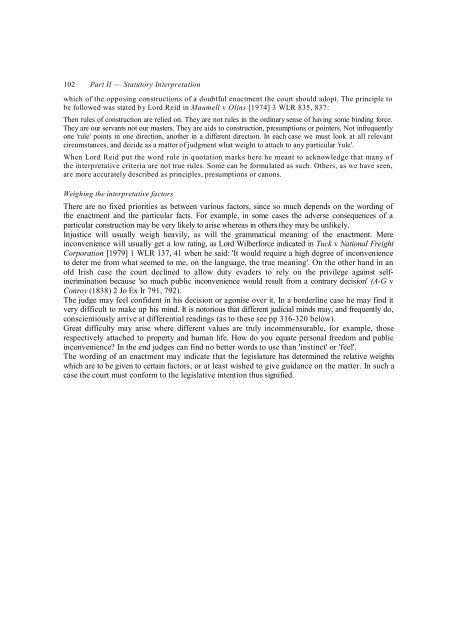Statutory Interpretation The Technique of Statutory ... - Francis Bennion
Statutory Interpretation The Technique of Statutory ... - Francis Bennion
Statutory Interpretation The Technique of Statutory ... - Francis Bennion
Create successful ePaper yourself
Turn your PDF publications into a flip-book with our unique Google optimized e-Paper software.
102 Part II — <strong>Statutory</strong> <strong>Interpretation</strong><br />
which <strong>of</strong> the opposing constructions <strong>of</strong> a doubtful enactment the court should adopt. <strong>The</strong> principle to<br />
be followed was stated by Lord Reid in Maumell v Olins [1974] 3 WLR 835, 837:<br />
<strong>The</strong>n rules <strong>of</strong> construction are relied on. <strong>The</strong>y are not rules in the ordinary sense <strong>of</strong> having some binding force.<br />
<strong>The</strong>y are our servants not our masters. <strong>The</strong>y are aids to construction, presumptions or pointers. Not infrequently<br />
one 'rule' points in one direction, another in a different direction. In each case we must look at all relevant<br />
circumstances, and decide as a matter <strong>of</strong> judgment what weight to attach to any particular 'rule'.<br />
When Lord Reid put the word rule in quotation marks here he meant to acknowledge that many <strong>of</strong><br />
the interpretative criteria are not true rules. Some can be formulated as such. Others, as we have seen,<br />
are more accurately described as principles, presumptions or canons.<br />
Weighing the interpretative factors<br />
<strong>The</strong>re are no fixed priorities as between various factors, since so much depends on the wording <strong>of</strong><br />
the enactment and the particular facts. For example, in some cases the adverse consequences <strong>of</strong> a<br />
particular construction may be very likely to arise whereas in others they may be unlikely.<br />
Injustice will usually weigh heavily, as will the grammatical meaning <strong>of</strong> the enactment. Mere<br />
inconvenience will usually get a low rating, as Lord Wilberforce indicated in Tuck v National Freight<br />
Corporation [1979] 1 WLR 137, 41 when he said: 'It would require a high degree <strong>of</strong> inconvenience<br />
to deter me from what seemed to me, on the language, the true meaning'. On the other hand in an<br />
old Irish case the court declined to allow duty evaders to rely on the privilege against selfincrimination<br />
because 'so much public inconvenience would result from a contrary decision' (A-G v<br />
Conroy (1838) 2 Jo Ex Ir 791, 792).<br />
<strong>The</strong> judge may feel confident in his decision or agonise over it. In a borderline case he may find it<br />
very difficult to make up his mind. It is notorious that different judicial minds may, and frequently do,<br />
conscientiously arrive at differential readings (as to these see pp 316-320 below).<br />
Great difficulty may arise where different values are truly incommensurable, for example, those<br />
respectively attached to property and human life. How do you equate personal freedom and public<br />
inconvenience? In the end judges can find no better words to use than 'instinct' or 'feel'.<br />
<strong>The</strong> wording <strong>of</strong> an enactment may indicate that the legislature has determined the relative weights<br />
which are to be given to certain factors, or at least wished to give guidance on the matter. In such a<br />
case the court must conform to the legislative intention thus signified.

















